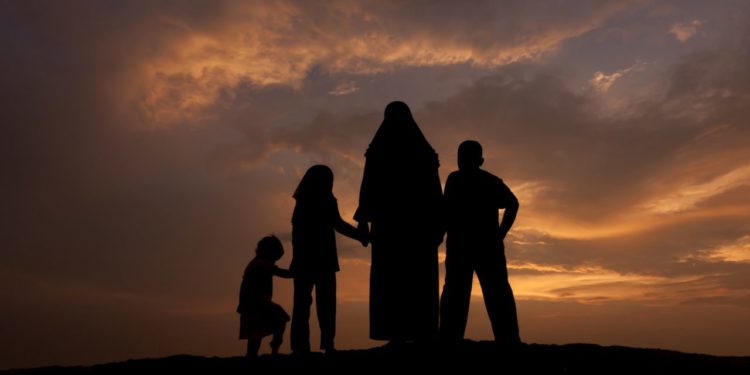The Motivation Behind the PeaceQuest Content for Muslim Parents
By Abid Ullah Jan
As a father of six children raised in Canada and working in the community development field for years, I have some observations to share with Muslim parents. These observations are all the more important in light of the recent killings and arrests of Muslim youth in Ottawa.
First, we need to dispel some myths. For example:
1) the high rates of crimes and incarceration of Muslim youth are not real – in fact, they are.
2) Muslim youth are confused because they learn in the family one thing and they are expected to behave differently outside. In fact, the basic standards and norms of human decency are the same all over the world.
3) Social adjustments while keeping the family/cultural values are significant challenges. They are not if we set the priorities right.
The reality to counter these myths is that most of what we do depends on our perspective of success and failure. If we teach the wrong criteria for success in our children’s minds, they end up in complete disaster after achieving what they consider as success.
The repeated shooting, murders and arrests of Muslim youth are indicators of most serious failure – there are other related failings, but they are not as glaring.
Of course, we all look for answers when faced with a glaring failure.
From a criminologist’s perspective, there are many risk and protective factors. However, it’s essential to look at things from an Islamic perspective to dispel the myth mentioned here.
To begin with, if learned and taught properly, Islam doesn’t lead to any confusion of any kind. Instead, it provides one of the best mechanisms and a set of protective factors to keep Muslims of all age groups safe from going to the extremes in whatever they do.
There is nothing wrong with the youth. The youth are actually not educated and raised the way they should have been.
We can’t blame our youth if we, as parents, couldn’t make them understand the bigger picture of Islam, in which all elements of our faith are interdependent and interconnected.
We can’t blame our youth if we fail to help them understand the two sides of our reality: 1) the physical body and 2) our essence (Rooh or soul) as the spiritual aspects of our existence.
We can’t blame our youth if we fail to explain our life’s purpose and the concept of achieving human excellence (Ihsan) – nurturing our soul without losing touch with the physical reality.
We can’t blame our youth if they find glamour in drugs, gangs and quick money due to our failure to help them understand the purpose of their existence.
It is our fault if our children feel an insatiable spiritual thirst that longs to be fulfilled, and they fill the void with other adventures and glamour.
We can’t blame our youth if we failed to strengthen their faith (Iman) before engaging them in practice (Islam) and ensuring they know their aim in life is to achieve human excellence – not making loads of money.
The first thing for the Muslims to stay on the right path of to come back to the straight path is to remember who they are.
Children who go off track have either not learnt or forgotten who they are. They don’t realize that they are more than they have become.
In the absence of proper guidance, our youth develop a new idea of who they are – an idea that is borrowed from external sources: how people treat them, how they judge them and so on.
In the process, they lose their true self, and they try to live life from a new manufactured platform that is an amalgam of inaccurate and fault perceptions of who youth think they are and how others feel towards them.
Our youth ignore Islam, the divine guidance and practice the faith because they don’t truly believe. They opt for a life of deprivation and lack. This state gives rise to tenacious greed and selfishness. It is lack and deprivation at its best.
One of the reasons most Muslim youths are involved in crimes is they have learnt some basics of the deen. They do feel guilt. They try to fill the void with the wrong alternatives.
Guidance is in the hands of Allah. However, if their parents had done their job correctly, there is a high likelihood that these youth would be true believers. They would have the best protective shield to protect them from falling prey to negative influences in the community.
Our youth fail to utilize their potential when they can’t use the tools to achieve human excellence and the ULTIMATE SUCCESS!
So, for parents, the first thing to teach is to make their children realize who they are and their purpose in life, not becoming money-making machines.
Conceptual clarity is the key. We can’t put various parts in isolation. Like faith, the belief in the angels, books, day of judgement, in total isolation from the practice (Islam). These are interconnected elements. We need to show our young ones the connection between Iman (faith) and how Islam (practicing the faith) is built upon the foundation of Iman. And how these two, actually lead to Ihsan or excellence.
Starting from the top, Ihsan means beautifying, making beautiful, or doing with excellence. So how would we do the best?
Prophet Mohammed (PBUH) explained Ihsan as worshiping as if you see Allah. However, if you can’t imagine that, imagine that He’s watching you.
Praying with that imagination, you feel yourself in the presence of the Authority, the ultimate Authority. Just as you won’t cross the speed limit if a copy car is driving besides you or visibly parked. Same is the case with feeling in the presence of Allah. If you feel being in the presence of the Ultimate Authority, you won’t do anything wrong.
So now, the important thing here is strong belief in that Authority and worship.
We need to expand this concept of worship for our kids. We are not working only when we pray or fast or go to Hajj.
We are, in fact, worshiping 24/7. By expanding the concept of worship as slaves nor mere worshipers helps us keep in mind that He is watching us. That way, we won’t do anything wrong. However, how can we be in worship 24/7?
According to Prophet Mohammed PBUH, every action is based on our intentions. So even when you are sleeping, it could be worship because if your intention is to get enough sleep for fajr prayer, the whole night you slept was counted for your good deeds.
So the point is, again, if you’re a true believer, then regardless of what you do, if your intention is good, that becomes your worship. You wake up early in the morning, going to work or school, or whatever you do in life; if your intention is good, that becomes worship.
You can’t be praying the five prayers that we have 24/7. You can’t be fasting 24/7, and you can’t be giving charity 24/7. But, whatever you do, if your intention is good, so the hadith you mentioned, “every action depends on your intention.”
By that intention, everything you do during the day or night becomes your worship, and when you are in worship, and you do it in a way that Allah is watching you, then that takes you to achieve human excellence and close the doors to negative influences and deeds.
So that’s the connection to faith, and that is the greatest protective factor for our youth to save them from many negative influences in their lives.







